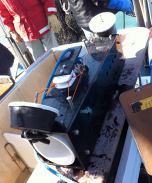Since 2012, COSEE-TEK has collaborated with one of its founding partners, the Louis Stokes Alliance for Minority Participation (LSAMP) to provide minority undergraduate students majoring in STEM-related fields an opportunity to become immersed in in ocean science and technology. The partnership evolved from a focused two-day workshop involving UConn students to a broader Ocean Science and Technology Challenge (OSTC) that in 2014 will involve all five universities in the Northeast LSAMP Alliance. The approach of the OSTC is to have the students work together to design, build, and field test an ocean sensor or sampling device in Long Island Sound (LIS). The goal is twofold: to engage minority undergraduate students in ocean science and technology and immerse them in a hands-on, team environment to problem solve – with the intent of developing 21st Century competencies.
Evolution of the Program
Spring 2012: During the first year of the LSAMP collaboration, a group of minority students from the University of Connecticut at Storrs came to the Avery Point campus for a two-day educational institute focused on ocean science and technology. The main objectives were to work as teams to construct low-cost hydrophones, conduct laboratory trials of these DIY devices, and use them in Long Island Sound the following day. Student majors ranged from pre-medicine, pharmacy, environmental science to electrical engineering, yet all were eager to learn more about the ocean. Some students had never stripped or soldered wires, some had never stepped foot on a boat, and most had little understanding of sound propagation in the sea. However, they all rolled up their sleeves and worked as a team, learning a great deal about ocean technology, specifically the application of hydrophones to study acoustics in the marine environment.
Winter 2013: Following the LSAMP Northeast Alliance Winter Symposium at Storrs in January 2013, students and LSAMP Coordinators from the University of Connecticut and UMass-Amherst participated in the 2013 Ocean Science & Technology Challenge (OSTC). Incorporating evaluation data from the 2012 session, COSEE-TEK raised the bar by challenging students with design and development of the technology. Each team was challenged to come up with an ocean sensor or sampler, design the device on a budget of $300, and build it before coming to UConn-Avery Point to test it in a real-world situation on the Long Island Sound.
Each team was assigned a COSEE-TEK mentor to help guide the project. Activities included research on the web, meetings and teleconferences, engineering design and review, ordering parts, and construction in the laboratory. Despite the challenges of an expedited timeline, full academic course loads, exams, research papers, and spring break, the teams identified the following projects and worked enthusiastically to have their technologies ready for the two-day field experience at UConn-Avery Point on April 5-6, 2013.
LSAMP OSTC Projects
The UCONN team built a benthic monitoring array (right) using an existing frame to mount two GoPro hi-def cameras, LED lights, and a current meter they built based on the design of Vitalii Sheremet through the
eMOLT program at NOAA’s Northeast Fisheries Science Center in Woods Hole, MA. This low-cost current meter was designed to distribute to lobstermen for attachment on their traps throughout the Gulf of Maine and was a great challenge for the LSAMP students.
The UMASS team designed and built a plankton & water sampler (below, left) similar to a traditional Niskin or Van Dorn device. Their objective was to collect approximately 3 liters of water at multiple depths of the water column near the placement of the benthic monitoring array. Students then investigated the quantity and diversity of plankton from these samples taken throughout the water column.
 | |
|
From the outset many students were apprehensive about the task of building an ocean sensor or sampler. Many were unsure of themselves before visiting Avery Point, but gained confidence from working closely with COSEE-TEK staff and their peers to design, build, problem-solve and implement their technology. Collectively, they learned the value of teamwork, cross-discipline collaboration and communication - the 21st Century competencies they will need to succeed in the future. Evaluation results indicated the second year’s OSTC was highly successful and well received by participants, but many students expressed the need for more time and more interactivity early in the project…an observation that will be incorporated into this year’s OSTC.
Ongoing: In November 2013, COSEE-TEK held an LSAMP Symposium in Sturbridge, MA attended by 28 students and advisors from the five institutions in LSAMP’s Northeast Alliance (UConn, UMass-Amherst, URI, WPI and Northeastern). Events included a seminar about ocean science and technology, a webinar about careers for minorities in oceanography, and hands-on activities with accelerometers, hydrophones, and simple ocean profilers. The symposium concluded with teams from each institution gathering to assign roles, schedule meetings, and hone in on a technology for the upcoming challenge. COSEE-TEK mentors are currently working with assigned teams to begin the brainstorming and design phases for the 2014 OSTC. The evolution of this partnership has been guided by debriefings and pre-post evaluation data that have provided valuable guidance regarding the structure and timing of the Challenge. COSEE-TEK envisions the LSAMP collaboration continuing beyond COSEE as a significant ocean science and technology contribution.
 |
|

